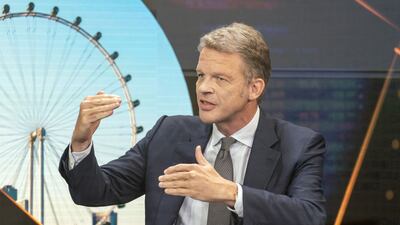Europe’s banks have remained sanguine on their outlook for this year, a war on their doorstep and rampant inflation notwithstanding. It is dawning on them that 2023 could be much worse.
Top executives from Deutsche Bank to ABN Amro Bank are predicting a recession next year that could burden them with souring loans.
European watchdogs monitoring systemic dangers warned of increased “tail risks” for the industry. And in the background, some regulators are already in talks with lenders to remind them of the need to preserve capital.
“We have the ingredients for a perfect storm” in the economy next year, Raimund Roeseler, head of banking supervision at Germany’s financial watchdog BaFin, said on Wednesday.
The change of tone comes as surging energy bills are threatening to put companies out of business and runaway inflation is leaving consumers struggling to pay their bills.
While European lenders so far are still reaping the benefits from rising interest rates and a market volatility that has fuelled trading revenue, there is a growing realisation in boardrooms from Frankfurt to Amsterdam that there is a flip side to both.
Their views increasingly coincide while opinions elsewhere remain divided over how deep the contraction might be.
Billionaire Citadel founder Ken Griffin said on Wednesday that US consumers are spending more on things such as airlines and electronics, which creates “a real powerful tailwind” to the economy. On the same day, famed investor Stan Druckenmiller said he is not ruling out “something really bad” next year and that markets may stagnate for a decade.

The risk is particularly pronounced in Europe, where damage from the shutdown of Russian gas flows is piling up fast. Bloomberg Economics now predicts a roughly 1 per cent contraction in the euro-region economy, starting in the fourth quarter.
The drop could worsen to as much as 5 per cent if there is a harsh winter and the EU members fail to share fuel supplies. That would be about as deep as the recession of 2009.
The European Systemic Risk Board, a body designed to monitor financial risk, last week took the unprecedented step of issuing a general warning, a statement on Thursday showed.
A multitude of negative events have combined to create substantial perils to financial stability, such as sharp asset price drops and lower bank profits.
“A pronounced deterioration in the macroeconomic outlook would imply a renewed increase in credit risk at a time when some credit institutions are still in the process of working out Covid-19 pandemic-related asset quality problems,” the ESRB said.
Banks should ensure that “provisioning practices and capital planning properly account for expected and unexpected losses”.
There will be “a deeper recession in the next 12 months” in Europe and Germany, Deutsche Bank chief executive Christian Sewing said in an interview on Wednesday.
He added that he expects provisions for bad loans to increase and that it is imperative for the European Central Bank to “get inflation under control”.
Mr Sewing’s counterpart at Dutch lender ABN Amro, Robert Swaak, struck a similar tone, predicting a recession in the second half of next year in an interview on Tuesday.
“The inflationary pressure is what everyone worries about,” he said.
Both lenders for now are benefiting from higher rates, which are boosting lending revenue.
Mr Sewing said momentum so far this quarter has been good and confirmed a profitability target for the year.
Italy’s UniCredit plans to “substantially upgrade” its guidance in the third quarter, chief executive Andrea Orcel said last week. And Mr Swaak signalled ABN Amro might give itself more leeway to reward shareholders with more buy-backs.
Such moves, however, are likely to be monitored closely by regulators, given the outlook for next year. While the ECB so far has not indicated any concern, during the pandemic it did step in to curb payouts and ensure banks keep lending after being granted extra regulatory leeway.

